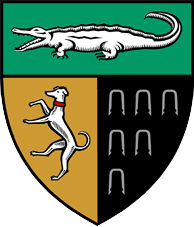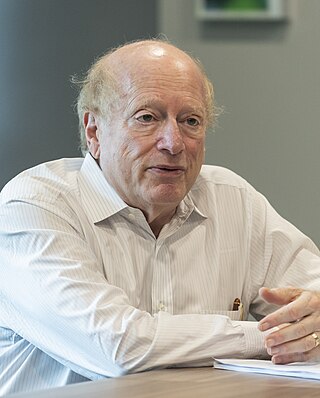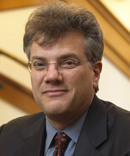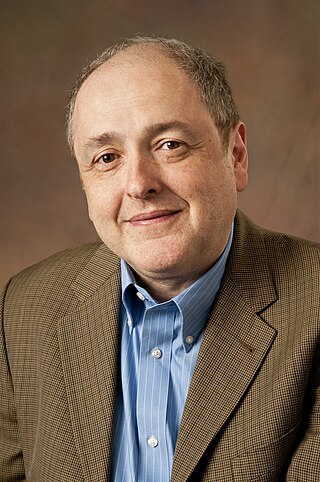
Stanford Law School (SLS) is the law school of Stanford University, a private research university near Palo Alto, California. Established in 1893, Stanford Law had an acceptance rate of 6.28% in 2021, the second-lowest of any law school in the country. Since October 2023, Robert Weisberg has served as its dean.

The University of Chicago Law School is the law school of the University of Chicago, a private research university in Chicago, Illinois, currently ranked 3rd in the 2023-2024 U.S. News' Best Law Schools ranking. It employs more than 180 full-time and part-time faculty and hosts more than 600 students in its Juris Doctor program, while also offering the Master of Laws, Master of Studies in Law and Doctor of Juridical Science degrees in law. The law school has the third highest percentage of recent graduates clerking for federal judges after Stanford Law School and Yale Law School.

Yale Law School (YLS) is the law school of Yale University, a private research university in New Haven, Connecticut. It was established in 1824. The 2020–21 acceptance rate was 4%, the lowest of any law school in the United States. Its yield rate of 87% is also consistently the highest of any law school in the United States.
Jenny S. Martínez is an American legal scholar and Stanford University's 14th provost. Stanford University President Richard Saller named her to the position in August 2023, effective October 1, 2023. Martinez succeeded Persis Drell, who announced in May that she would step down as provost. From April 2019 to September 2023, she served as the Dean of Stanford Law School. She joined the Stanford faculty in 2003, and has taught courses on constitutional law, international law, and human rights. She is a leading expert on international law and constitutional law, including comparative constitutional law. She is the author of The Slave Trade, The Origins of International Human Rights Law, and numerous articles in leading academic journals.

Samuel Issacharoff is an American legal scholar and constitutional law expert. His scholarly work focuses on constitutional law, voting rights and civil procedure. He is the Bonnie and Richard Reiss Professor of Constitutional Law at New York University School of Law.
Kathleen Marie Sullivan is an American lawyer and name partner at Quinn Emanuel Urquhart & Sullivan, a global, litigation-only law firm headquartered in Los Angeles, California. Based in the firm's New York City office, Sullivan chairs its national appellate practice group. She is the first and only female name partner at an Am Law 100 law firm. Previously, Sullivan served as dean of Stanford Law School, where she was the Stanley Morrison Professor of Law.

Mark Victor Tushnet is an American legal scholar. He specializes in constitutional law and theory, including comparative constitutional law, and is currently the William Nelson Cromwell Professor of Law at Harvard Law School. Tushnet is identified with the critical legal studies movement.

Michael J. Klarman is an American legal historian and scholar of constitutional law. Currently, Klarman is the Kirkland & Ellis Professor at Harvard Law School. Formerly, he was James Monroe Distinguished Professor of Law, Professor of History, and Elizabeth D. and Richard A. Merrill Research Professor at the University of Virginia School of Law.

Pamela Susan Karlan is an American legal scholar who was the principal deputy assistant attorney general in the Civil Rights Division of the United States Department of Justice from February 8, 2021 until July 1, 2022. She is a professor at Stanford Law School. A leading legal scholar on voting rights and constitutional law, she previously served as U.S. Deputy Assistant Attorney General for Voting Rights in the DOJ's Civil Rights Division from 2014 to 2015.

Richard H. Pildes is the Sudler Family Professor of Constitutional Law at the New York University School of Law and a leading expert on constitutional law, the Supreme Court, the system of government in the United States, and legal issues concerning the structure of democracy, including election law. His scholarship focuses on public law and legal issues affecting democracy.

Brian Leiter is an American philosopher and legal scholar who is Karl N. Llewellyn Professor of Jurisprudence at the University of Chicago Law School and founder and Director of Chicago's Center for Law, Philosophy & Human Values. A review in Notre Dame Philosophical Reviews described Leiter as "one of the most influential legal philosophers of our time", while a review in The Journal of Nietzsche Studies described Leiter's book Nietzsche on Morality (2002) as "arguably the most important book on Nietzsche's philosophy in the past twenty years."

Mariano-Florentino "Tino" Cuéllar is an American scholar, academic leader, public official, jurist, and nonprofit executive currently serving as the 10th president of the Carnegie Endowment for International Peace. He was previously a Justice of the Supreme Court of California, the Stanley Morrison Professor of Law at Stanford University and director of Stanford's Freeman Spogli Institute for International Studies, co-chair of the U.S. Department of Education's Equity and Excellence Commission, and an executive branch official in the Clinton and Obama administrations. His publications address problems in American public law, international affairs and international law, artificial intelligence, public health and safety law, and institutions and organizations. He serves on the State Department's Foreign Affairs Policy Board. A member of the American Academy of Arts and Sciences and the National Academy of Sciences Committee on the Social and Ethical Implications of Computing Research, he serves as chair of the board of the William and Flora Hewlett Foundation. He was born in Northern Mexico.

Larry D. Kramer is an American legal scholar and nonprofit executive who is the incoming president and vice chancellor of the London School of Economics and Political Science, commencing in April 2024. Kramer was the president of the William and Flora Hewlett Foundation from 2012 through 2023. Prior to that role, he was the dean of Stanford Law School (2004–2012). He is a scholar of both constitutional law and civil procedure.
Jane S. Schacter is an American legal scholar who serves as the William Nelson Cromwell Professor of Law at Stanford Law School with an expertise in constitutional law, statutory interpretation, and sexual orientation law. As an expert on the topic of marriage equality, Schacter has been interviewed by numerous leading news publications, including The New York Times, The Washington Post, The Economist, The Guardian, Bloomberg Businessweek, and the San Francisco Chronicle.
Gerald Gunther was a German-born American constitutional law scholar and a Professor of Law at Stanford Law School from 1962 until his death in 2002. Gunther was among the twenty most widely cited legal scholars of the 20th century, And his 1972 Harvard Law Review article, "The Supreme Court, 1971 Term Foreword: In Search of Evolving Doctrine on a Changing Court: A Model for a Newer Equal Protection," is the fourth most-cited law review article of all time. Gunther's path-breaking casebook, Constitutional Law, originally published in 1965 and now in its 17th edition, is the most widely used constitutional law textbook in American law schools.
Stuart Alan Banner is an American legal historian and the Norman Abrams Professor of Law at the UCLA School of Law. Banner also directs UCLA's Supreme Court Clinic, which offers students the opportunity to work on real cases before the U.S. Supreme Court.

The 2020 United States redistricting cycle is in progress following the completion of the 2020 United States census. In all fifty states, various bodies are re-drawing state legislative districts. States that are apportioned more than one seat in the United States House of Representatives are also drawing new districts for that legislative body.

William Patrick Baude is an American legal scholar. He currently serves as a professor of law at the University of Chicago Law School and is the director of its Constitutional Law Institute. He is a scholar of constitutional law and originalism.
Constitutional hardball is the exploitation of procedures, laws and institutions by political actors for partisan gain in ways which violate pre-established norms and push the bounds of legality. Legal scholars and political scientists have characterized constitutional hardball as a threat to democracy, because it undermines shared understanding of democratic norms and undermines the expectation that the other side will comply with democratic norms. As a result, the use of constitutional hardball by one side of partisans encourages other partisans to respond in similar fashion.
Mary Kathleen "Kit" Kinports is an American legal scholar who is Professor of Law and the Polisher Family Distinguished Faculty Scholar at Pennsylvania State University. She has taught there since 2006 and specializes in feminism, criminal law and constitutional law.













